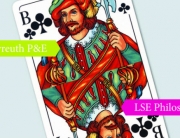As AI increasingly makes moral judgments across diverse cultures, Western philosophical foundations alone may not suffice. However, ancient Chinese traditions offer valuable alternative frameworks for AI ethics. The “lost wallet problem” reveals how Kant, Mengzi, and Daoist perspectives approach the same moral dilemma with fundamentally different reasoning. In our latest LSE Philosophy blog article, CPNSS visitor Percy Venegas Obando argues that integrating diverse philosophical traditions should become a strategic imperative for creating truly ethical AI that serves humanity’s cultural diversity.
In “Genesis: Artificial Intelligence, Hope, and the Human Spirit” Henry Kissinger, Eric Schmidt and coauthors (Kissinger et al., 2024) call for philosophers to take a central role in developing artificial intelligence. While there is potentially a significant contribution from Kantian thought to the field, as they suggest, we should acknowledge that today the ethical foundations governing machine learning systems originate predominantly from Western philosophical traditions. As AI increasingly influences or assists in moral judgments within culturally diverse situations (such as how to allocate sovereign wealth to support or stimulate the economy, prioritize government research, or retaliate in a conflict), it is imperative to integrate broader philosophical ideas. Ancient Chinese philosophical traditions, including Daoism and Confucianism, provide alternative frameworks that could enhance our understanding of AI ethics. As advanced intelligence permeates international relations, such an approach has implications for strategy, global security and defense, competition and markets.
Same Issue, Different Approaches: The Lost Wallet Problem
Bryan W. Van Norden’s “Introduction to Classical Chinese philosophy” (Van Norden, 2011) invites us to consider the simple scenario of returning a lost wallet. This elementary moral problem reveals how different philosophical traditions approach the same ethical question in a fundamentally different manner. Kant would argue that the act of returning the wallet has moral value solely when performed out of respect to moral law. Actions motivated by compassion or emotional responses possess no genuine moral value, as these sorts of sentiments are ethically neutral and beyond our control. Mengzi (Mencius) presents a contrasting view, positing that the motivation for returning the wallet arises from a “feeling of compassion” for the owner’s distress and a “feeling of disdain” for the shameful act of theft. According to Mengzi, these innate moral sentiments are fundamental to ethical behavior. The Daodejing presents an alternative viewpoint: both Kant and Mengzi are misguided. Authentic virtue manifests when one returns the wallet solely because the thought of retaining it does not occur—an embodiment of “nonaction” (wu-wei) marked by spontaneity and simplicity.
These discrepancies reflect profound epistemic divergences. Western philosophy has generally prioritized “knowing that” —propositional knowledge accompanied by rational argument. In contrast, a significant portion of ancient Chinese philosophy emphasizes “knowing how” —an embodied form of knowledge that cannot be entirely encapsulated by any particular form of language.
Implications for AI Ethics and Governance
In developing systems designed to facilitate moral judgments in diverse worldwide contexts, we must acknowledge the cultural constraints of any single ethical framework. These philosophical differences are not solely academic concerns, they are measurably divergent model outputs. A model trained primarily on Western frameworks might evaluate the wallet problem (or any public or private goods scenario for that matter) mainly through rule-driven reasoning, missing the intuitive moral wisdom emphasized in Asian traditions. This divergence in models must be understood.
For example, integrating concepts from ancient Chinese philosophy into AI ethics may entail:
- Creating algorithms that acknowledge diverse cultural frames for assessing identical actions.
- Recognizing that ethical reasoning transcends propositional knowledge to encompass embodied practical wisdom.
- Developing more adaptable ethical frameworks that do not solely favor rule-based reasoning.
The divergent approaches of Kant, Mengzi, and the Daodejing to identical moral dilemmas underscore that ethical AI must not depend on a singular tradition. While the Western and Chinese technology stacks compete to conquer market share, with the popularization of Sovereign AI (Letzing, 2024) other countries will create their models (as the UAE has done) and their own philosophical traditions might also be reflected in those. As we continue developing increasingly autonomous systems, we should ensure that our approach to machine ethics is as diverse as the cultures these systems will support and serve. Practically, we can implement regional concepts into a global one by offering different perspectives in the form of ensembles of evolving models rather than a singular persistent one (such an approach is in fact consistent with another world tradition, Buddhism). Similar to how humans from different cultures have formulated distinct interpretations of moral conduct, genuinely ethical AI must traverse numerous intellectual domains.
By Percy Venegas
Percy Venegas (Economy Monitor, Polymathica) is a visiting researcher at the Centre for Philosophy of Natural and Social Science as part of the project Genetically Evolving Models in Science (GEMS), the Editor-in-Chief of the Journal on AI Policy and Complex Systems (Policy Studies Organization Washington, DC.), and an affiliate of the King’s Institute for Artificial Intelligence (King’s College London).
Notes
Letzing, J. (2024, November 13). What is ‘sovereign AI’ and why is the concept so appealing (and fraught)? World Economic Forum. https://www.weforum.org/stories/2024/11/what-is-sovereign-ai-and-why-is-the-concept-so-appealing-and-fraught/
Kissinger, H., Mundie, C., Schmidt, E., Runde, E., & Ferguson, N. (2024). Genesis: artificial intelligence, hope, and the human spirit. First edition. Little, Brown and Company.
Van Norden, Bryan W. (2011). Introduction to classical Chinese philosophy. Indianapolis: Hackett.




























































































































Connect with us
Facebook
Twitter
Youtube
Flickr